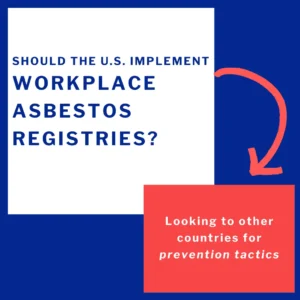Key takeaways: Victoria (AUS) has mandated asbestos registries for government-owned buildings, in an attempt to proactively protect its citizens against asbestos. These registries include the exact location of asbestos, its condition, whether it’s accessible, and other factors that contribute to its danger. The U.S. doesn’t mandate any asbestos registries, although federal intervention would be helpful for streamlining asbestos removal and replacement. By effect, this would prevent unnecessary harm and disease.
What’s an asbestos registry?
An asbestos registry is a record of asbestos in a given place. Depending on the type of registry—and the needs it seeks to satisfy—a registry might keep track of the type of asbestos, the location in which it’s found, who might’ve interacted with said asbestos, or even the likelihood of asbestos being present in a certain place before it’s found.

In an effort to mitigate asbestos exposures in government-owned buildings, Victoria (Australia) created workplace registries to track asbestos. (Importantly, Australia completely banned asbestos in 2003—decades before the U.S. This context sheds light on differences in proactive measures taken by the U.S. and Australian governments.) These workplace registries track the exact location of asbestos in the buildings, the type of asbestos, whether or not it’s accessible, its condition, and the date of identification. All of these factors inform Victoria’s policies and actions: if a building frequented by hundreds of employees daily has accessible, dilapidated asbestos, then the asbestos removal task force will address that building first.
Importantly, Victoria has public interest in removing asbestos: it has been established as a carcinogen and public health threat that can be mitigated. In the U.S., the rhetoric around asbestos is markedly different. This means that individuals are compelled to act in different ways based on the priorities and actions of their local governments.
Toxic Substances Control Act (TSCA)
The Environmental Protection Agency (EPA) recently (2023) instated a mandate for reporting asbestos data. Per the 2024 asbestos ban, all forms of asbestos are not to be used, processed, imported, or exported in the U.S. The mandate for reporting—which falls under the Toxic Substances Control Act (TSCA)—requires that any company making over $500,000 in annual sales report any asbestos contamination, exposures, or incidents from 2019-2022 to the EPA. This helped the EPA to determine which sectors and companies were still utilizing (or producing) asbestos up until the ban took effect. By effect, these records will help the EPA allocate resources and proactive energies to these places, ideally mitigating unnecessary asbestos exposures.
Unlike Victoria, though, the EPA doesn’t require workplaces (or even federal agencies, land, or buildings) to use asbestos registries. This means that there isn’t a streamlined process for a.) recording sites of asbestos; b.) tracking the extent of asbestos degradation or damage; or c.) “triaging” which buildings need attention first. Instead, private companies and landlords are responsible for addressing any instance of asbestos.
Instead of allowing asbestos to be handled privately, the EPA might want to intervene at a federal level. If we look to Australia as a model for our asbestos (and asbestos-related disease) trajectory, then we know that we need to radically improve our proactive approach. Currently, the U.S. operates as a reactive entity—addressing asbestos only comes after it’s degraded or actively posing threats to communities. Instead, the U.S. should consider federally intercepting the responsibility of asbestos under the TSCA. This would generate jobs, spur on local interest in removing asbestos, and ultimately mitigate mesothelioma and other asbestos-related disease.
If you or a loved one has been diagnosed with mesothelioma or another asbestos-related disease, please call The Halpern Law Firm at 1 (800) 505 – 6000. We are here to help you navigate the legal process just like we have helped many others. Do not hesitate to contact us today.
Sources:
https://onlinelibrary.wiley.com/doi/full/10.1111/resp.14648
